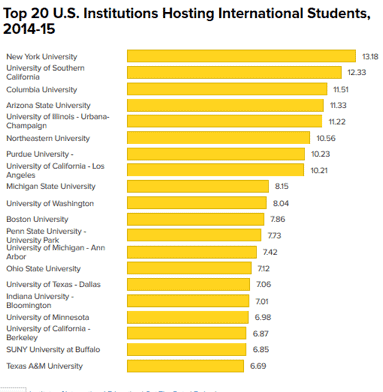12/30/16

As we come to the end of 2016, we’d like to dedicate this final blog for the year to international students and the myriad of benefits they bring to the economic and cultural fabric of the U.S Let’s take a closer look.
Economic Benefits
The economic benefits of having international students on U.S. campuses are impressive. According to the Brookings Institute, foreign students “paid $22 billion in tuition between 2008 and 2013 as well as at least $13 billion in living expenses.” According to the U.S. Department of Commerce: “In 2015, International students contributed more than $30.5 billion to the U.S. economy, according to the U.S. Department of Commerce.”
International students are able to fund their education in the U.S. through funds they receive from personal and family sources outside the U.S. They also receive financial support from their home country governments or universities.
Additional breakdowns of economic impact by state and Congressional District, calculated using IIE’s Open Doors enrollment figures, are available on the NAFSA International Student Economic Value Tool website.
Take a look at the chart below to see the countries which send most of the students to study in the U.S. These numbers grew from approximately 975,000 in 2015 to 1,043,839 in 2016.


Source: The Atlantic
Cultural, Scientific, Technical Research Benefits
In addition to the economic benefits of having international students on U.S. campuses, the cultural gains are equally positive and impactful. The benefits of American students who actively engage and interact with international students on their college campuses are tremendously positive and impactful. American students exposed to and interacting with international students are more likely to read or speak a foreign language, appreciate art, music, literature of different cultures, and view current problems in historical perspective. They also are more likely to be more open minded and curious and interested to reexamine their political and religious viewpoints and their beliefs about other races or ethnicities. They may even consider traveling outside the U.S. or studying abroad.
Another significant benefit of having international students studying in the United States is that they contribute to America’s scientific and technical research. They bring with them international perspectives and stories of their personal experiences into U.S. classrooms. All these contribute to helping prepare American college students to be better equipped for careers in the global job market and in many cases helps them build and foster longer-term business relationships and economic benefits with their international student counterparts after graduation.
This reminds me of a taxi ride I once had from the airport in Reno, NV to a conference hotel. When I told the driver that I was attending a conference on international education, I was pleasantly surprised to hear him lecture me on the many benefits his city receives from its foreign students. He cited how international students contribute to the city’s businesses through their purchases, renting apartments, leasing or buying cars, paying insurance, going to the movies, eating at restaurants, and so much more. Clearly, he got it! And let’s not forget that many international students bring with them their spouses and children for the duration of their studies and these additional persons also help the economy. According to NAFSA, for the 2013-2014 academic year, “international students and their families at colleges and universities across the U.S. contributed $26.8 billion to the U.S. economy and supported 340,000 jobs. Compared to the previous academic year, this is nearly a 12 percent increase in dollars contributed to the economy and an 8.5 percent increase in job support and creation.” Another important and positive side effect of having international students on U.S. campuses which NAFSA found is that “three U.S. jobs are created or supported for every seven international students enrolled. These jobs are in higher education, accommodation, dining, retail, transportation, telecommunications, and health insurance.”
These economic benefits have not gone unnoticed by countries such as Canada, UK, and Australia who are aggressively seeking ways to attract and recruit international students to their institutions. Though, at this time, the UK–having undergone the Brexit referendum– is taking a harsher stand against international students. We, in the international education community, urge our representatives in Washington and the incoming administration to take the significance of international students and their contributions to the U.S. economy and the fabric of our higher education into serious consideration before embarking on any anti-immigration policies and legislations. A negative and hostile stand against immigration if not clearly defined will alienate the international students who enter the U.S. legally on student visas and deter them from seeking the U.S. as their higher education destination. They will in turn look to friendlier countries like Canada and Australia. The U.S. will have a great deal to lose.
Useful Links:
https://today.duke.edu/2013/06/internationalengage
http://immigrationimpact.com/2014/11/19/international-students-add-billions-u-s-economy/
http://www.universityworldnews.com/article.php?story=20150212092452773
http://www.theatlantic.com/education/archive/2015/11/globalization-american-higher-ed/416502/
http://www.migrationpolicy.org/article/international-students-united-states

Jasmin Saidi-Kuehnert is the President and CEO of the Academic Credentials Evaluation Institute (ACEI).

The Academic Credentials Evaluation Institute, Inc. (ACEI), was founded in 1994 and is based in Los Angeles, CA, USA. ACEI provides a number of services that include evaluations of international academic credentials for U.S. educational equivalence, translation, verification, and professional training programs. ACEI is a Charter and Endorsed Member of the Association of International Credential Evaluators. For more information, visit https://acei-global.org/.


